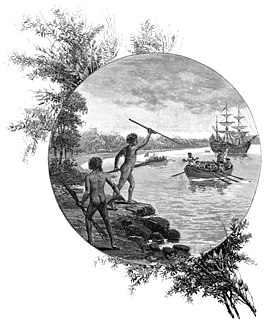Kurnell, New South Wales
|
Kurnell Sydney, New South Wales |
|||||||||||||
|---|---|---|---|---|---|---|---|---|---|---|---|---|---|

Artwork depicting the first contact with Captain James Cook and crew with the Gweagal Aborigines
|
|||||||||||||
| Population | 2,213 (2011 census) | ||||||||||||
| Postcode(s) | 2231 | ||||||||||||
| Location | 22 km (14 mi) S of Sydney CBD | ||||||||||||
| LGA(s) | Sutherland Shire | ||||||||||||
| State electorate(s) | Cronulla | ||||||||||||
| Federal Division(s) | Cook | ||||||||||||
|
|||||||||||||
Kurnell is a suburb in Sydney, in the state of New South Wales, Australia. It is 21.4 kilometres (13.3 mi) south of the Sydney central business district, in the local government area of the Sutherland Shire along the east coast.
Kurnell is on the south eastern headland of Botany Bay. Cronulla and Woolooware are the only adjacent suburbs. La Perouse is located opposite, on the northern headland of Botany Bay.
The eastern side of the peninsula is part of Botany Bay National Park. Towra Point Nature Reserve is located on the western side of the suburb.
Kurnell is the place where Captain James Cook landed on 29 April 1770, making first contact with the original inhabitants of the area, the Gweagal Aborigines whilst navigating his way up the East Coast of Australia on Endeavour. Captain Cook along with his crew stayed at Kurnell for a period of eight days. During their visit they collected botanical specimens, mapped the area and tried to make contact (unsuccessfully) with the indigenous population. When Cook reported back to England he said that the land was suitable for agriculture and was lightly wooded.
Captain Arthur Phillip, arriving in H.M. Armed Tender Supply on 18 January 1788, before the First Fleet arrived, following Cook’s advice. They began to clear land and dig wells, near modern-day La Perouse but a week later, Phillip decided to abandon the site and moved north to Sydney Cove at Port Jackson.
...
Wikipedia
